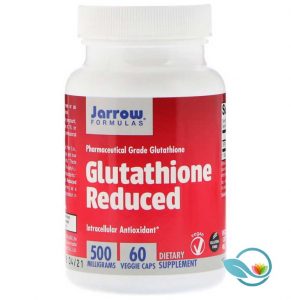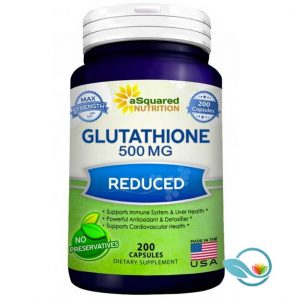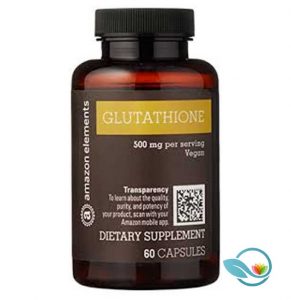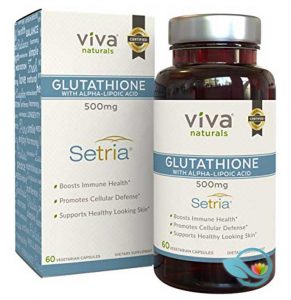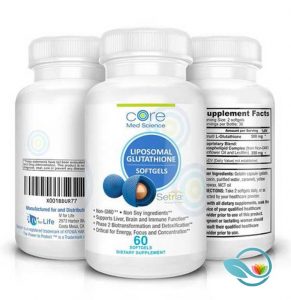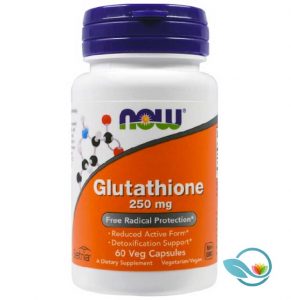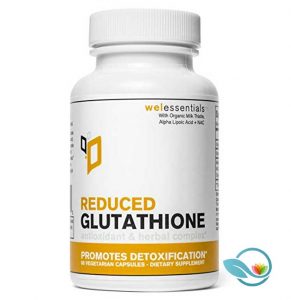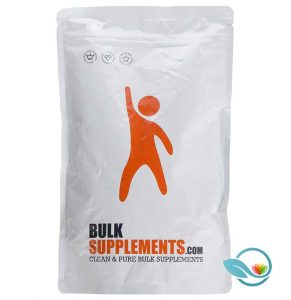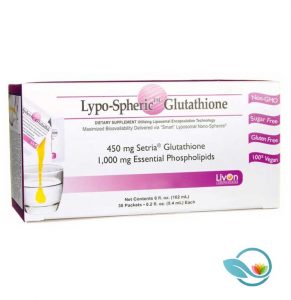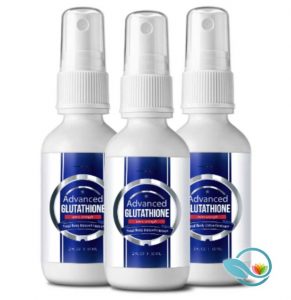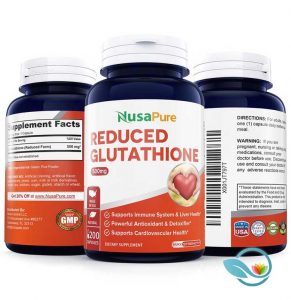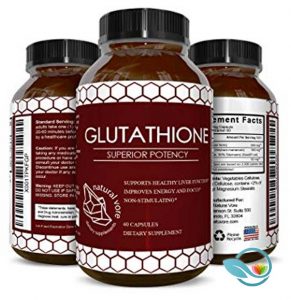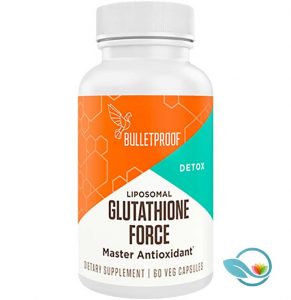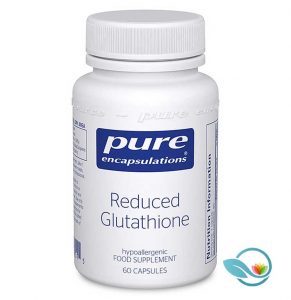Vitamins
Best Glutathione Supplements of 2019
Published
6 years agoon
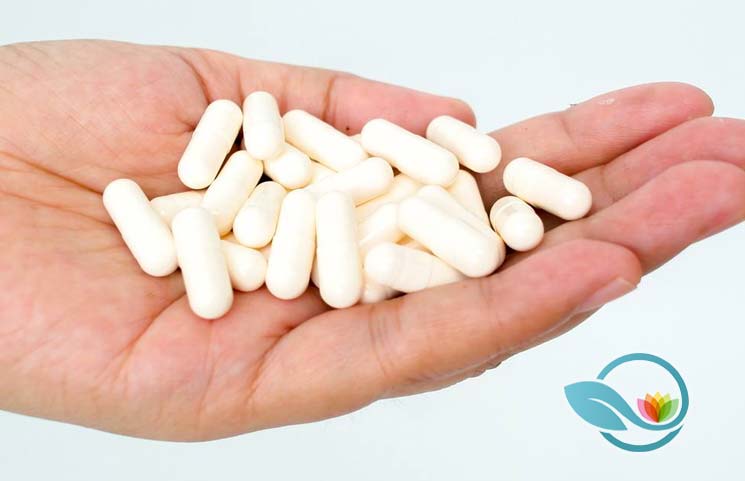
Glutathione is a powerful antioxidant prized for its ability to fight inflammation, neutralize free radicals, and cleanse toxins from your body.
Although you can get glutathione from food, some people are taking a different approach: they take a glutathione supplement.
Glutathione supplement manufacturers make huge claims about the effectiveness of their formulas. Some claim their formulas can reduce the effects of aging. Others claim glutathione can help your body recover from exercise. Some people just take glutathione because they want full body health and wellness.
Whatever your health goals may be, glutathione may be able to help. Today, we’re ranking the best glutathione supplements of 2019.
The Best Glutathione Supplements of 2019
Jarrow Formulas Reduced Glutathione
Jarrow Formulas offers one of the best-value and most popular glutathione supplements on the market today. Each vegetable cellulose capsule of this formula contains 500mg of glutathione. The supplement uses simple ingredients with no unnecessary additives. There’s just one listed active ingredient in the formula: OPITAC Glutathione, a trademarked glutathione formula.
Jarrow Formulas claims their supplement can be used to support liver health by acting as an intracellular antioxidant. Like other reduced glutathione supplements, the reduced glutathione here is sourced from three amino acids, including cysteine, glutamate, and glycine.
Each bottle of Jarrow Formulas Reduced Glutathione includes 120 capsules (120 servings) at a price of around $28 on Amazon. You can also find it sold from other retailers.
aSquared Nutrition Reduced Glutathione
aSquared Nutrition makes a popular glutathione supplement that combines a strong dose with a competitive price point. One of the few drawbacks of the supplement (at least for some people) is that the formula is packaged into animal-sourced glycerin capsules. Glycerin and rice flour, however, are the only listed ingredients aside from glutathione.
Each capsule of aSquared’s glutathione supplement contains 500mg of glutathione. A bottle containing 200 capsules is priced at around $40 on Amazon. The manufacturer recommends taking two capsules per day to support health benefits, so each bottle is a 100 day supply.
As with other reduced glutathione (GSH) supplements here, the glutathione is made from three amino acids, including cysteine, glutamate, and glycine. The formula claims to reduce oxidative stress caused by free radicals.
Amazon Elements Glutathione
If you’re looking for a simple, no-nonsense glutathione supplement at a reasonable price, then it’s hard to compete with the Amazon Elements glutathione supplement. Each vegan capsule includes 500mg of reduced glutathione. There are no other active ingredients.
A bottle containing 60 capsules (60 servings) is priced at just $22 form Amazon, making this one of the most cost-effective supplements on the list. As with other Amazon supplements, you can request a full refund up to one year after you purchased the supplement. It’s hard to argue against that.
Viva Naturals Reduced Glutathione
Viva Naturals Reduced Glutathione is the first supplement on this list to contain ingredients aside from pure glutathione. This supplement is priced at $25 for 60 capsules with 500mg of glutathione and 150mg of alpha lipoic acid (ALA) in each capsule. Viva Naturals claims ALA was added to the formula because it’s a naturally occurring ingredient that helps keep glutathione active within the body.
Other advertised benefits of the Viva Naturals Reduced Glutathione supplement include better immune system health, better cellular defense, and healthier looking skin.
Core Med Science Liposomal Glutathione Softgels
Core Med Science makes one of the bestselling glutathione supplements on the market today. The company has packaged 850mg of formula into each 2 softgel serving. Each two capsule serving includes 500mg of Setria L-Glutathione, which is a registered trademark glutathione formula, along with 350mg of a proprietary blend containing a phospholipid complex sourced from non-GMO sunflower oil and lecithin.
As with the aSquared glutathione supplement above, this glutathione supplement is packaged into animal-sourced gelatin capsules. Core Med Science recommends taking two softgels on an empty stomach 30 to 45 minutes before eating or taking other supplements to support liver health, improve immune system activity, and detoxify the body.
NOW Glutathione
NOW Glutathione is one of the most prolific supplement makers on the market today. It seems any time there’s a trendy ingredient, NOW Glutathione sells a formula containing that ingredient. The glutathione industry is no different, and NOW Glutathione offers 60 veggie capsules in each bottle. Each capsule contains 500mg of reduced glutathione along with 100mg of milk thistle extract and 50mg of alpha lipoic acid (ALA) to enhance absorption.
NOW claims their glutathione supplement can help protect your body against free radicals, which helps maintain normal cellular function “in the face of daily stressors & pollution.”
Wel Essentials Reduced Glutathione
Wel Essentials offers a great deal on their 500mg glutathione supplement. You can pay $20 for a single bottle or save a little bit of money by ordering 3 bottles for around $55. Each 2 capsule serving (30 servings per container) includes 500mg of Setria reduced glutathione, 400mg of an antioxidant and herbal blend (containing N-Acetyl-Cysteine, grape seed extract, organic milk thistle extract, and alpha lipoic acid), and 375mg of vitamin C (625% of your Daily Value).
Overall, there are more ingredients in this formula than most other glutathione supplements on this list, including proven antioxidants like vitamin C and proven glutathione supporters like milk thistle extract and ALA. Although it’s priced higher and has a lower dose (250mg of glutathione per capsule) than competing supplements, some will appreciate the fact that there are other ingredients inside that can help achieve similar detoxifying goals.
BulkSupplements Glutathione Reduced Powder
Most glutathione supplements come in the form of capsules. A handful, however, come in the form of pure powder. The BulkSupplements Glutathione Reduced Powder is one such supplement. A 100g package is priced at around $50, although you can also buy 10g packages ($17) and 1kg packages ($300) online through Amazon or BulkSupplements.com.
Your glutathione powder is delivered in a factory sealed foil zip pouch. You can mix it into water, a shake, or the beverage of your choice. With a bulk supplement, you can not only control the dosage, but also save money over buying prepackaged supplements.
LivOn Laboratories Lypo-Spheric Glutathione
LivOn Laboratories makes a unique glutathione supplement where the formula is packaged into 30 x 450mg liquid packets. You rip open a packet and add it to water, a shake, or the beverage of your choice – or just drink it on its own.
It’s not cheap: you’ll pay around $60 for just 30 packets. However, there are other ingredients beyond glutathione. Each packet contains 450mg of Setria reduced glutathione, 1000mg of essential phospholipids (from soy lecithin), and 500mg of phosphatidylcholine (PC). The active ingredients are packaged into inactive liquid ingredients including deionized water, alcohol, and potassium hydroxide.
LivOn Laboratories recommends taking one packet a day to give your body the antioxidants it needs.
CCL Advanced Glutathione Spray
This is the third supplement in a row that uses a unique delivery method for its glutathione. The CCL Advanced Glutathione Spray claims to detoxify your body and relieve cells from oxidative stress. A bottle with 120 servings is priced at around $25 from Amazon.
More importantly, CCL claims that using glutathione as a spray will lead to 90% absorption compared to just 10% absorption with a pill.
Each serving of CCL Advanced Glutathione Spray consists of six sprays, and there are approximately 120 servings in each container. Each six spray serving delivers approximately 4840 mcg of a proprietary formula containing reduced glutathione, acetyl-l-carnitine, ALA, ashwagandha extract, l-glutamine, ginseng, and other ingredients.
Nusa Pure Reduced Glutathione
NusaPure’s glutathione supplement includes 500mg of reduced glutathione in each capsule and 200 capsules in each bottle. With a bottle costing around $25 from Amazon, this is one of the best-value glutathione supplements available today.
There are no other listed active ingredients in the formula. However, inactive ingredients include gelatin and rice powder in the capsule, making this supplement non-vegan and non-vegetarian friendly.
Natural Vore Glutathione Superior Potency
Natural Vore Glutathione Superior Potency is one of the bestselling and highest-rated glutathione supplements on Amazon. With over 1300 customer reviews, the supplement has an average rating of 4.6 stars out of 5.
Each 1 capsule serving (30 servings/capsules per container) includes 500mg of reduced glutathione, 100mg of milk thistle extract, and 50mg of alpha lipoic acid. It’s not the best-value glutathione supplement available today. However, it provides a good blend of glutathione and other supporting ingredients at a reasonable price ($30 per 30 serving bottle).
Bulletproof Glutathione Force Master Antioxidant
Bulletproof has made a name for offering high-quality, high-priced nutritional supplements that claim to supercharge your body in various ways. The Bulletproof Glutathione Force supplement claims to use a “proprietary delivery system for effective absorption”. That delivery system includes 500mg of glutathione in each 3 veggie capsule serving (30 servings / 90 capsules per container).
There are no other listed ingredients on the label on Amazon. However, Bulletproof claims their formula also uses phosphatidylcholine palmitic acid and oleic acid that delivers glutathione in its purest possible form.
The high price will turn most away considering how many cheaper options there are on this list. Each 30 serving bottle is priced at $60, making it the most expensive glutathione supplement on this list by far.
Pure Encapsulations Reduced Glutathione
Pure Encapsulations makes a standard glutathione supplement that’s similar to every other formula on this list – but at a much lower dose. Each capsule contains 100mg of reduced glutathione. A bottle, priced at around $20, contains 60 capsules (60 servings).
Considering every other supplement on this list contains around 500mg of glutathione, it’s hard to recommend the Pure Encapsulations formula unless you’re specifically trying to take a lower dose of glutathione (or you find it on sale for a great price).
Our Rankings
Glutathione supplements vary widely in terms of quality, ingredients, and dosages. After careful deliberation, we sorted the best glutathione supplements in the world into the list above. Our editorial team spent hours ranking glutathione supplements based on all of the following metrics and features:
Dosage of Glutathione
The best supplements above contained a dose of 500mg of glutathione in each 1 capsule serving. Some glutathione supplements used just 100mg of glutathione in each serving. Generally, we emphasized supplements that used the same glutathione dosage used in most clinical studies to date.
Other Ingredients and Glutathione Precursors
We preferred glutathione supplements that only used glutathione. However, some science shows that other ingredients – like ALA – can enhance the absorption of glutathione by acting as a precursor. We included a variety of supplements with all types of ingredients. Some supplements above contain only glutathione. Others contain glutathione and glutathione precursors like NAC and ALA. Some supplements also contain additional detoxifying ingredients like ginseng. We featured a range of supplements to support all different health goals.
Price and Value
Glutathione supplements vary widely in price. Some of the supplements above are priced as high as $2 per serving. Others are priced for less than $0.50 per serving. We made sure every supplement provided good value. However, we still wanted to show a range of supplements
Label Transparency
Some supplement manufacturers hide their dosages behind proprietary formulas, making it impossible to determine the individual dosages of any specific ingredient. We emphasized glutathione supplements with clear, transparent ingredient labels.
Delivery Method
Not all glutathione supplements come in the form of capsules. Some supplements listed above use sprays, softgels, or even liquid shots. Studies on the bioavailability of different glutathione delivery methods remain relatively rare. However, we wanted to feature supplements with a range of different delivery methods to suit all preferences.
Additives, Fillers, Binders, and Other Ingredients
Some glutathione supplements contain just glutathione packaged into a vegetable cellulose capsule. Others use additives, binders, fillers, and other ingredients to keep the formula together. We emphasized pure supplements over supplements with unnecessary additives.
Manufacturer Quality and Reputation
Whenever there’s a trendy supplement ingredient, we see a rush of low-quality producers scrambling to produce low-quality supplements to fill the niche. We emphasized reputable manufacturers with a proven history of quality and transparency.
Glutathione Source
You’ll notice many of the glutathione supplements above emphasize the fact that the powder comes from the United States – not China. We emphasized glutathione supplements with clear labeling and high-quality sources.
Who Should Take Glutathione?

People take glutathione to support all different health benefits. Some people believe glutathione provides general detoxification across the body, neutralizing free radicals, detoxifying the liver, and improving general health and wellness in various ways.
Others take glutathione to boost the immune system. They claim it makes your immune system more effective, for example, helping your body fight illness and disease.
Some of the most prolific glutathione users are athletes. They take glutathione to recover from athletic performance. Others are bodybuilders, weekend warriors, or just people who go to the gym a few times a week.
Unlike with other supplements, however, there’s not necessarily a single definitive health goal when taking glutathione. People don’t take glutathione to lose weight, for example, or to enhance cognition. They take it to do pretty much everything.
We’ll talk more about the benefits of glutathione below, including whether or not any of these benefits are proven by science – or if this is just another overhyped, under-studied nutritional supplement with limited scientific evidence?
Benefits of Glutathione

Glutathione is used as a powerful antioxidant that can neutralize free radicals, combat oxidative damage, reduce inflammation, and eliminate toxic compounds like heavy metals. Because of these purported benefits, glutathione is a popular supplement among those trying to detoxify, treat chronic diseases, or support general health.
But does glutathione stand up to scientific scrutiny? Or does science refute these claims?
Some studies have shown that glutathione can help maintain a healthy immune system, reducing your risk of disease and illness. As your body gets older, your immune system naturally deteriorates. Some people also have naturally weaker immune systems than others – say, due to chronic illnesses.
Researchers from Tufts University investigated the effects of glutathione supplements in young and old mice to analyze the effects on the immune system. Their work was published in Mechanisms of Ageing and Development.
After administering a glutathione supplement to both the older and younger mice, researchers found it made the immune system stronger and more similar to that of the younger mice. Researchers found that the older mice had higher T-cell responses, for example, which is a measurement of how well your immune system fights back against infection.
Importantly, these effects have not been replicated in humans. However, the effects on mice are promising.
Results from other studies have suggested that glutathione can reduce the oxidative stress on your body caused by exercise. Some people take glutathione as an athletic recovery formula. One of the necessary consequences of exercise is that it puts your body through a lot of oxidative stress: your body is going through a lot more oxygen in a shorter period of time when you’re exercising at a high intensity. This can cause oxidative stress to your cells.
This study published in the Journal of the International Society of Sports Nutrition by researchers at Baylor University explored the connection between glutathione and oxidative damage. Glutathione directly counters oxidative stress, which could make it effective for reducing damage to your body caused by high intensity exercise. Glutathione is thought to work by preventing the oxidation of lipid membranes that coat the outsides of cells. Because of this effect, glutathione could lead to improved performance, faster recovery times, and superior overall health.
There’s also some evidence that glutathione could combat chronic fatigue syndrome. This study published in 2014 by researchers at Cornell University explored the link between chronic fatigue syndrome and oxidative stress. Based on their analysis, researchers suggested glutathione levels could have something to do with it.
Scientists scanned the brains of people with chronic fatigue syndrome to analyze their levels of glutathione and other antioxidants. They found that lower glutathione levels were associated with changes in ventricular lactate levels, which is a biomarker for fatigue. They also found that people with chronic fatigue syndrome had higher oxidative damage and oxidative stress. Because of these associations, researchers believe that glutathione may be able to relieve symptoms of chronic fatigue syndrome.
However, glutathione on its own may not be enough to raise antioxidant levels in the body.
One of the biggest clinical trials on glutathione was performed by researchers at the University of Washington. The study involved 40 adult volunteers split into two groups. One group took 500mg of glutathione twice per day (similar to the dose used in most supplements above). The other group took a placebo.
After four weeks of supplementation, researchers did not find any difference in antioxidant levels between the placebo group and the glutathione group. Despite taking 1000mg of glutathione for four straight weeks, participants in this study did not have any higher antioxidant levels than participants taking a placebo pill for four weeks.
Critics will point out that researchers in this study used only pure glutathione with no precursors or additional ingredients. They did not use ALA or NAC, for example, which both act as precursors to glutathione in the body and may support the activity of glutathione when taken in supplement form.
Other studies have shown that taking glutathione supplements will increase glutathione levels in your blood and boost the immune system.
This study by a group of researchers from Penn State University, for example, involved a randomized, double-blind, placebo-controlled trial to determine if glutathione supplements legitimately increased glutathione levels in the blood.
Researchers gave 54 healthy adults either a placebo, a daily 250mg glutathione supplement, or a daily 1000mg glutathione supplement. Researchers reported significantly higher levels of glutathione stores in both of the treatment groups after a six month study period. This was the first study that showed an oral glutathione supplement could raise glutathione levels in the body.
Importantly, researchers also noticed that the glutathione groups had multiple improvements in immune function, including a twofold increase in natural killer cell cytotoxicity in patients who took the higher dose of glutathione. Because of this, researchers believe that glutathione supplementation can have clinically significant effects that can improve patient health outcomes.
Recent improvements in delivery technology may have made glutathione supplements even more effective. This study published in Redox Biology in 2015, for example, showed that a sublingual form of glutathione (taken underneath the tongue) was absorbed much more easily by the body. Researchers claimed their results “demonstrate the significant superiority of a new sublingual form of GSH [glutathione] over the oral form, both in terms of bioavailability and positive effects on oxidative stress.”
One of the supplements above consisted of sublingual glutathione drops. The rest are oral supplements or liquids.
Others take glutathione to assist beneficial gut bacteria and aid in digestion. Growing research has indicated just how important of a role probiotic gut bacteria play in your overall health. Could glutathione assist the activity of gut bacteria?
One study published in Scientific Reports suggests that glutathione might be able to combat certain bacteria problems in the intestines. Specially, glutathione could reduce the activity of a “bad” gut bacteria called helicobacter genus, which is linked to problems like ulcers and chronic gastritis. The study analyzed the effects of oral supplementation of glutathione on animals. Researchers found that glutathione reduced inflammation in the stomach and slowed the proliferation of helicobacter bacteria.
One study actually analyzed the impact of glutathione on cancer treatment. The work was published in the Journal of Experimental Therapeutics & Oncology. Researchers found that glutathione may regulate tumor growth and increase the therapeutic response to cancer treatment by boosting your body’s immune and detoxification systems. Because of this study, some believe that glutathione could have anti-cancer benefits. However, much more research needs to be done to verify these benefits.
Many of the supplements above claim to support general liver health. Certain studies have reinforced that idea. This study, for example, showed that glutathione directly neutralizes several different types of free radicals that cause cellular and tissue damage, including free radicals produced during the first phase of liver metabolism.
Finally, this study revealed that glutathione may do its best work by paving the way for other antioxidants to work. Researchers found that glutathione is a necessary component of the regeneration pathways for two other major antioxidants, including ascorbate (vitamin C) and tocopherol (vitamin A).
Ultimately, research on glutathione is surprisingly limited at this time. More research needs to be done to confirm its health benefits and antioxidant activity. Currently, research has shown that glutathione does not increase antioxidant levels in the human body – but it may aid your body in other ways. Studies have shown it may benefit the liver and digestive system, for example. Other studies have suggested anti-cancer benefits and more. Until more glutathione research is published, however, none of these health benefits are confirmed or definitive.
Side Effects of Glutathione

In most studies, glutathione is well-tolerated by most participants. Few patients report side effects, and few severe side effects have ever been reported.
In this 2011 study, the largest clinical study performed on glutathione, researchers found that the only reported side effects were increased gas and loose stools.
That study also took blood samples from participants and found no abnormal results. Participants did not have any disturbance to their normal, healthy functioning.
The lack of side effects for glutathione is unsurprising: it’s naturally found in foods like broccoli, kale, and cabbage. Your body is equipped to handle glutathione naturally.
However, we still recommend speaking with a doctor before taking a glutathione supplement. You should also stay within the manufacturer’s recommended dosage on your glutathione supplement.
Recommended Dose of Glutathione
Most clinical trails of glutathione involve a dose of 500mg to 1000mg administered daily. Typically, this dose is split into two servings.
Most of the supplements listed above match this dose, delivering 500mg of glutathione in each capsule. Certain supplements also have glutathione precursors like NAC or ALA, which may enhance the activity of glutathione even further.
Higher doses (beyond 1000mg of glutathione per day) have not been evaluated in any major trials to date.
FAQs About Glutathione
Q: What is glutathione?
A: Glutathione, or GSH, is an antioxidant and peptide found in plants, animals, fungi, and certain bacteria. Studies have shown that glutathione could prevent cellular damage caused by oxidation. The IUPAC name for glutathione is (2S)-2-Amino-4-{[(1R)-1-[(carboxymethyl)carbamoyl]-2-sulfanylethyl]carbamoyl}butanoic acid. You can see why it’s known more simply as “glutathione”.
Q: What are the benefits of glutathione?
A: The benefits of glutathione remain relatively under-studied. Various studies, however, have suggested that glutathione could detoxify the body and neutralize free radicals by flooding your system with antioxidants. Scientific studies on glutathione have been mixed, however, with one study showing no difference in glutathione levels after four weeks compared to a placebo. Nevertheless, other studies have indicated powerful health benefits of glutathione. More research certainly needs to be done.
Q: Can I get glutathione from foods?
A: Yes! Glutathione naturally occurs in certain foods. Typically, foods rich in sulfur-based amino acids are also rich in glutathione. Some of the best foods include broccoli, kale, and cabbage. Other foods or supplements with glutathione include milk thistle, whey protein, arugula, Brussel sprouts, cauliflower, collard greens, radish, turnip, and beef liver.
Q: Is glutathione deficiency a real thing?
A: Yes, you can be deficient in glutathione. Some studies have shown glutathione deficiency is linked to anemia, loss of coordination, fatigue, and muscle stiffness, among other issues. Interestingly, glutathione issues may be genetic. There has been limited research regarding glutathione deficiency, and its symptoms remain largely unknown and unconfirmed.
Q: Can glutathione improve skin health?
A: Some glutathione supplements claim to improve the health of your skin. Other people swear by the ability of glutathione to improve skin health. However, there are no current studies showing a connection between glutathione supplementation and improved skin health.
Q: Do I have to take glutathione via a capsule?
A: Nope. There are plenty of ways to take glutathione. Some people take glutathione in the form of a sublingual spray (underneath the tongue). Other glutathione supplements are liquid tinctures or liquid shots. Some people even take glutathione injections or glutathione IV drips at certain clinics.
Q: Why do people take glutathione?
A: People take glutathione to support a range of benefits. Generally, people believe glutathione detoxifies the body in various ways, neutralizing free radicals and improving immune system health. Some athletes also take glutathione to reduce oxidative stress after athletic performance. The health benefits of glutathione in humans have not been studied extensively, so it’s difficult to verify these benefits.
Q: Why do some glutathione supplements contain other ingredients?
A: Some of the glutathione supplements listed above contain ingredients aside from glutathione. They contain precursors like N-Acetylcysteine (NAC) or alpha lipoic acid (ALA), which may help your body synthesize and use glutathione. Other glutathione supplements contain additional detoxifying agents – like ginger extract. Some studies have shown that higher levels of NAC and ALA can boost the effectiveness and bioavailability of glutathione.
Q: What’s the best way to take glutathione?
A: In one of the studies linked above, researchers showed that sublingual glutathione supplementation was more effective than oral supplementation in terms of bioavailability. Your body can absorb more glutathione when taken in the form of drops under the tongue.
Q: What is liposomal glutathione?
A: Some of the supplements above contain liposomal glutathione. Supplement makers may claim this form of glutathione is more effective. However, no research has confirmed that liposomal glutathione is better. Technically, liposomal glutathione is just a blend of regular glutathione and a mixture of fat molecules (phospholipids) that make up the cell walls of plants and animals.
Q: What is reduced glutathione?
A: Most glutathione supplements above use reduced glutathione. Reduced glutathione may be more effective than a normal glutathione supplement. There are two basic forms of glutathione, including reduced or oxidized. Your body holds glutathione in the reduced state prior to fighting oxidation. Once the glutathione has stopped oxidizing chain reactions and ceased function as an antioxidant, glutathione becomes oxidized. For this reason, the reduced form of glutathione is preferred for combating oxidative damage.
Q: Can oral supplements really boost glutathione levels?
A: Studies on the health benefits of glutathione have been mixed. However, other studies have confirmed that taking an oral glutathione supplement can raise glutathione levels in the body. The question is whether or not higher glutathione levels are linked with improved health benefits. One of the biggest studies on glutathione to date, for example, showed that glutathione levels were higher but antioxidant levels were not significantly different from a placebo.
Glutathione Final Word
Glutathione is a trendy supplement ingredient purported to have powerful antioxidant and detoxification abilities. Some studies have shown that glutathione could boost liver and immune system health. Other studies have shown that glutathione has a limited effect on antioxidant levels in the body. Regardless, glutathione remains a popular supplement to this day – and the glutathione supplements above are some of the best in the industry.


